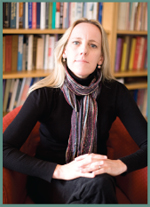Countering Frustration with Enlightenment Now

“IT WOULD BE A MISTAKE to think the message of the book is that we should be optimistic,” Steven Pinker tells our science and religion correspondent Clay Farris Naff in reference to his latest, Enlightenment Now: The Case for Reason, Science, Humanism, and Progress. Instead, the Harvard psychologist and cognitive scientist shows us that human wellbeing has increased globally over time and posits that if we analyze why this is so, we can improve the wellbeing of even more people.
So perhaps “accentuate the positive” is more like it. Of course, this can be a hard sell in the age of Donald Trump, global warming, and mass shootings. New York Times columnist David Brooks talks about the “scarcity mindset” we’ve fallen into, which functions as a kind of destructive mantra: “resources are limited. The world is dangerous. Group conflict is inevitable. It’s us versus them. If they win, we’re ruined, therefore, let’s stick with our tribe.” It’s not a shift in philosophy as much as it’s an anti-philosophy, one “that destroys every belief system it touches.” Pinker sees it, in part, as an impulse to reject the idea of progress—an impulse enabled by all the bad news we’re given on a regular basis.
“If it bleeds, it leads,” is the conventional wisdom in journalism and it’s certainly been so for a very long time. Psychology Today columnist Deborah Serani analyzes how fear-based news reporting succeeds. First, scary stories grab readers’ or viewers’ attention. But, Serani says, they also promise that “the solution for reducing the identified fear will be in the news story.” So if we watch a report of a terrorist attack followed by the president promising to wipe out ISIS, do we feel on some level that the problem’s solved? The challenge we face is to figure out where solutions truly lie and how they can realistically be implemented. And again, as Pinker stresses, to identify where progress has been made.
We must accentuate the positive in order to proliferate the positive. But we must also recognize that just because something is bad doesn’t mean it’s getting worse. However, this doesn’t mean we can’t shout about what’s truly bad, like the students at Marjory Stoneman Douglas High School and their Parkland, Florida, community did on February 15 when they chanted, “No more guns! No more guns!” the day after a former student killed seventeen people and wounded another fourteen at the school. Listening to NRA-funded politicians trying to talk about anything but the proliferation and availability of guns as the problem—they cite mental illness, unarmed teachers, violent films, and shooter games—can be extremely frustrating. (And they say nothing about the fact that the shooter, Nikolas Cruz, was a member of the US Army junior Reserve Officers’ Training Corps. Nothing about how in 2016 the NRA donated close to $10,000 to the school’s junior ROTC Marksmanship team.) The problem isn’t increased gun violence. The problem is that guns are used to kill people and some Americans can’t get enough guns.
During the 2008 presidential campaign Barack Obama got into hot water for saying of small town working-class voters: “They get bitter, they cling to guns or religion or antipathy to people who aren’t like them or anti-immigrant sentiment or anti-trade sentiment as a way to explain their frustrations.” How can humanism counter such frustration with enlightenment now?
According to a recently published study by researchers at Harvard and Indiana University, intense religiosity isn’t fading, but moderate religion is. Now more than ever we must attract nones and others who are casually shedding religion to a humanist position that supports religious freedom and tolerance, that champions human progress, and that enthusiastically embraces science. International Darwin Day is an ideal cause in this regard. Charles Darwin was born on February 12, 1809, and on or around that day humanists celebrate his contributions to our scientific understanding of the world and its species, and we celebrate science in general. Let’s make this a day to accentuate the positive as well. As the man himself said: “In the long history of humankind (and animal kind, too) those who learned to collaborate and improvise most effectively have prevailed.”
